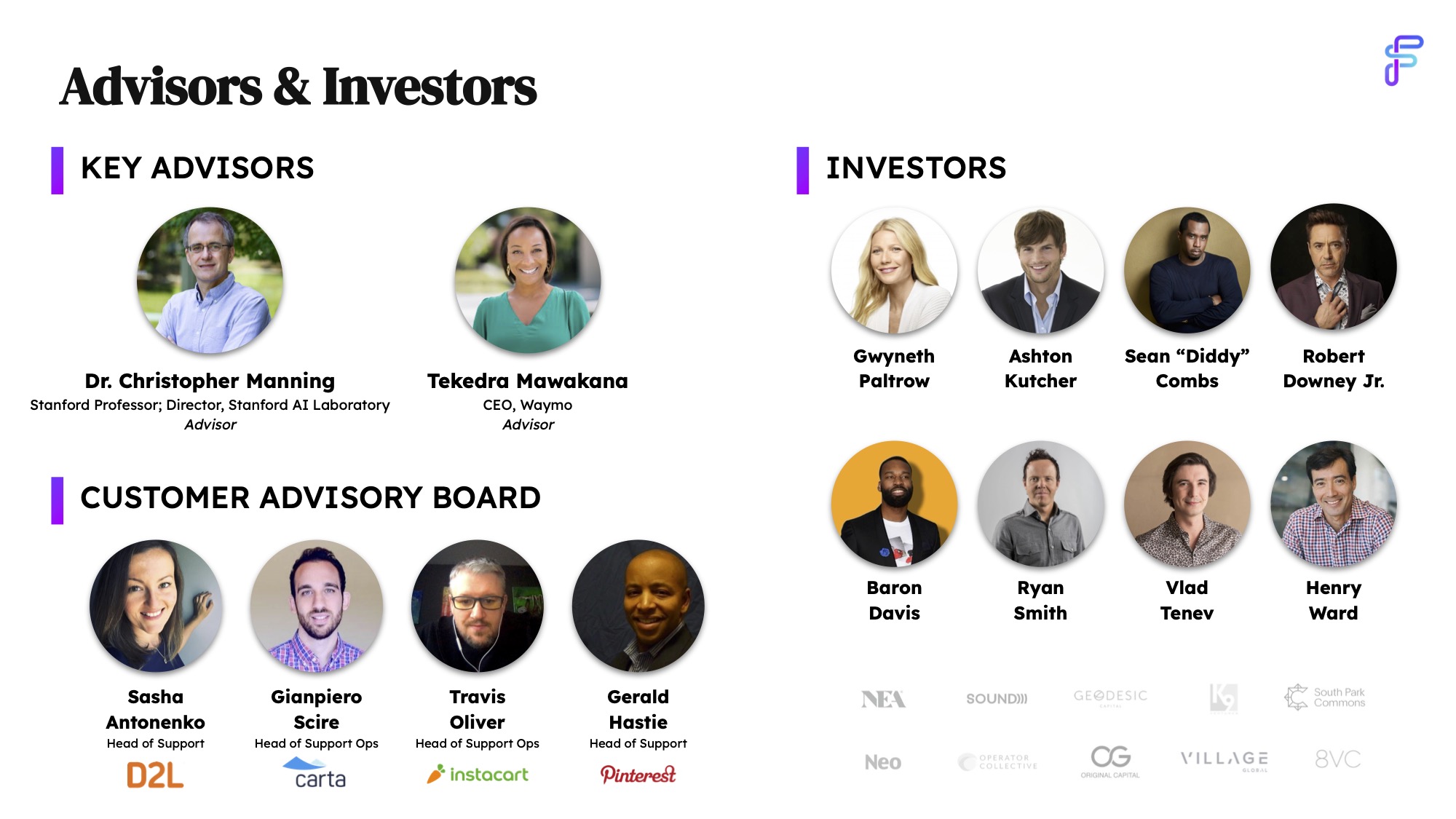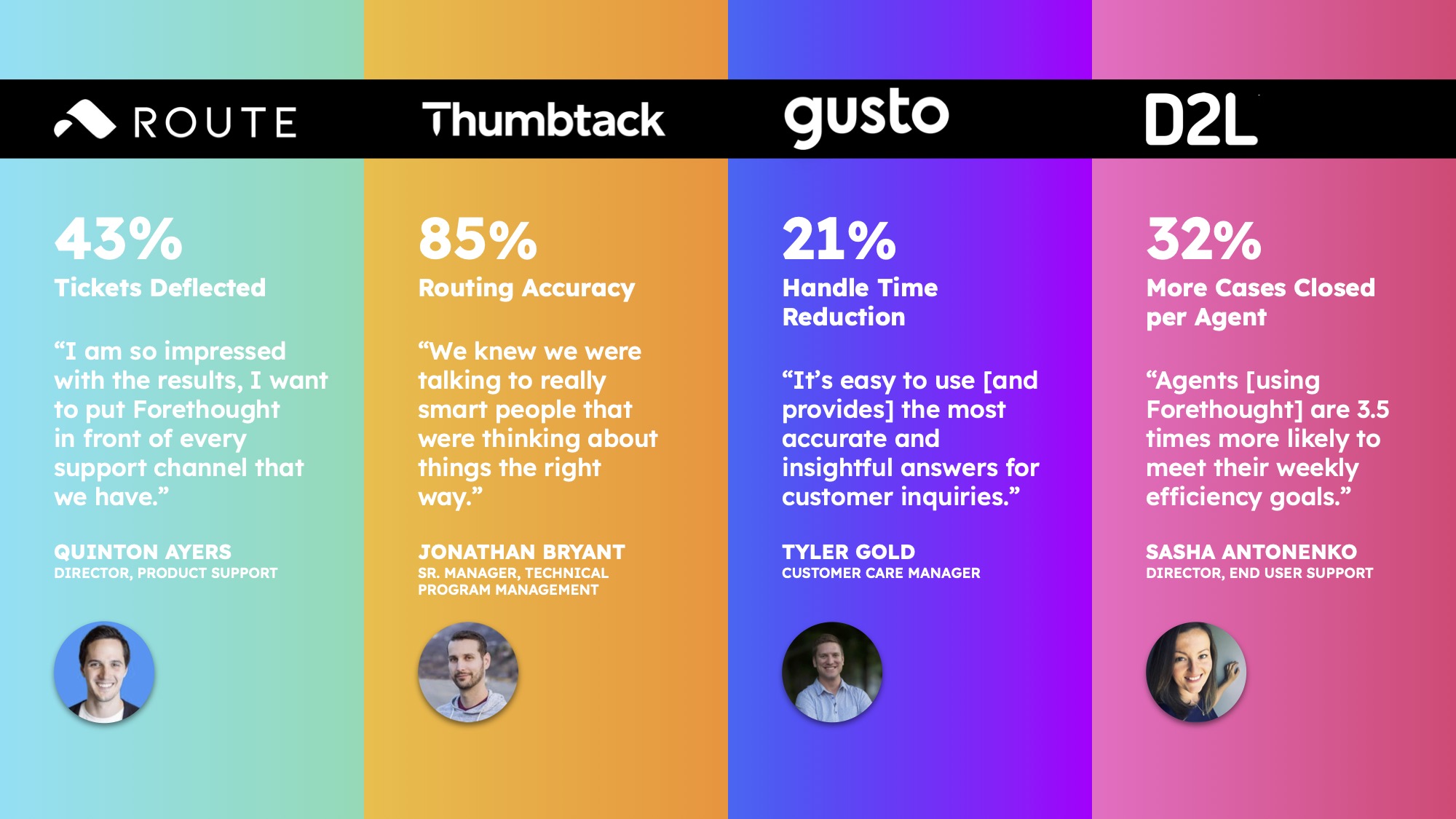Forethought has been on our radar for a long time — the company won our 2018 Startup Battlefield at TechCrunch Disrupt, and just a few weeks ago, CEO Deon Nicholas joined Vanessa Larco from NEA on TechCrunch Live to talk about pitching and pitch decks:
Today, it’s my pleasure to tear down the company’s 23-slide deck that helped it raise a $65 million Series C late last year.
Forethought’s mission is to help humans perform better using AI. “One of the things that we’ve focused on is being a human-centered AI platform. And that’s what has really come through … with our mission, and really our mission is to unlock human potential through artificial intelligence,” Nicholas told TechCrunch’s Ron Miller.
We’re looking for more unique pitch decks to tear down, so if you want to submit your own, here’s how you can do that.
Slides in this deck
In the vast majority of cases, this is a slide that makes my eyes glaze over; Forethought’s slide made me do a double take because it is a rare exception to that rule.
- Cover slide
- Founders slide
- TechCrunch Disrupt Startup Battlefield slide — (Yes, really!)
- Traction slide (redacted numbers)
- Customer list slide
- “Forbes 2021 next billion-dollar startups” — mystery slide
- “Think about the last time you were on hold” — problem slide
- “The cost of bad customer service” — problem slide
- “Transform customer experiences with human-centered AI” — solution slide
- “Complete platform” — product slide
- “True AI” — product slide
- “Rapid time-to-value” — product slide
- “Secure and trusted” — product slide
- “Intelligent gap detection” — product slide
- “Trusted by the best” — customer breakdown slide
- “Metrics Summary” (redacted) — traction slide
- Customer testimonials slide
- ARR expansion per cohort (redacted) — customer development slide
- “Forethinkers” team slide
- Advisors and investors slide
- “What’s next” (redacted) — road map slide
- “Where we’re going” (redacted) — revenue growth slide
- “Unlock human potential through AI” — mission slide
Three things to love
There’s a lot to love about this deck, and it’s hard to only pick three things. In the past few pitch deck teardowns, I’ve often focused on the beginning of the narrative — the first few slides.
Ending on mission
[Slide 23] Closing slide. Image Credits: Forethought
I’ve argued before how important it is to have a good final slide. To understand why, remember that in a lot of pitching situations, the first and last slides are on the screen for a longer time. The first because you’re faffing about with getting coffee, waiting for people and getting situated. The last because during the Q&A at the end of a pitch, it’s not uncommon to leave the final slide up — at least until you have to move to another slide in the deck to clarify something. To be fair, this was more true when you were pitching in-person than when you’re pitching virtually, but it’s good practice to make every slide do some heavy lifting.
A lot of the time, the final slide is just a repeat of the company’s tagline or motto and the founder’s contact details; it’s logical to repeat your vision or mission here, but it’s rarely done, and that’s a shame. If you have a clearly articulated mission, why not fly that flag as you’re doing your pitching?
Ugh, an investor slide

[Slide 20] Advisors, investors and customer advisory board. Image Credits: Forethought
A lot of startups include an advisors-and-investors slide. A customer advisory board is less common, but I’ve seen that, too. In the vast majority of cases, this is a slide full of people that makes my eyes glaze over — people who are unlikely to genuinely be of help to your company. Forethought’s slide made me do a double take because it is a rare exception to that rule. It initially caught my attention when I recognized Ashton Kutcher from the photo. That prompted me to take a closer look. This slide is extraordinary and probably the first of this type of slide I’ve seen that actually deserves to be part of the deck.
Having the CEO of Waymo and a Stanford AI lab professor as advisors is a flex. The customer advisory board includes (presumably busy) decision-making customers for Pinterest, Instacart and Carta. And the investors? Well … it’s not always clear how much actual time individual investors put into a startup, and that’d be a question I’d be asking Forethought, but it’s certainly a conversation starter: How did the company pull off adding a handful of household names to its cap table, and will they add value beyond their cash and famous faces?
Contextualized numbers are sexy

[Slide 17] Customer testimonials. Image Credits: Forethought (opens in a new window)
I include Slide 17 as a “thing to love” for a couple of reasons. Similar to the investors slide, it’s rare to see a customer testimonial slide that actually does any heavy lifting. Mostly it’s fluff that shows up instead of real traction. However, in this case, the company was able to do something really clever; Forethought is bringing some impressive customer stats to the forefront — and backing it up with real feedback from its customers.
In my past startups, I’ve done a lot of customer support, and if anyone had put any of those stats in front of me, I’d have bought on the spot: 43% of customer interactions don’t result in a support ticket? Routing accuracy of 85%? Handle tickets 21% faster and get 32% more productivity out of each of your customer support staff? That’s extraordinary by any measure — but tying it to customer testimonials makes the story come to life so much more. Very well done indeed. It also helps that the slide is well designed, easy to read and the logos show that these are a solid lineup of customers, too.
In the rest of this teardown, we’ll take a look at three things Forethought could have improved or done differently, along with its full pitch deck!

